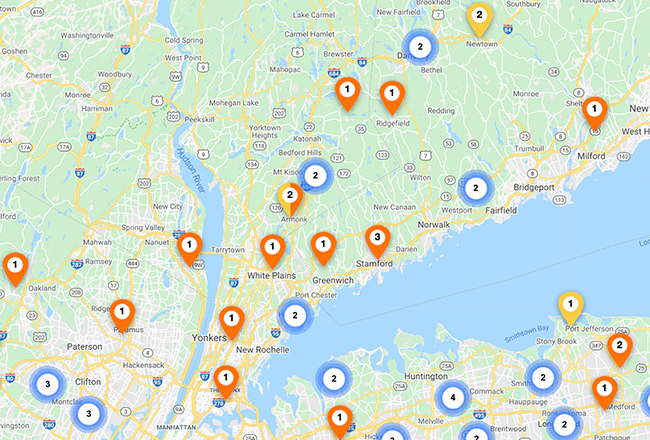
Scott Acheychek is president of REX Shares LLC, a Fairfield-headquartered independent sponsor of exchange-traded funds (ETFs). In this edition of Suite Talk, Business Journal Senior Enterprise Editor Phil Hall speaks with Acheychek about REX Shares”™ distinctive niche within the financial markets.
How did you get connected with REX Shares and why did you want to join this company?
“I joined REX about four years ago. I”™ve known the founder, Greg King, for a very long time. Greg is a pioneer in the ETF industry and has launched over 100 different exchange traded products. While I”™ve spent most of my career at big financial companies such as AIG and Citi, part of me always wanted to start my own company or be very early days at a startup. I joined REX shortly after Greg launched his first couple funds. It was a no-brainer to join Greg, an entrepreneur I knew well and respected, at a brand-new company in an industry that I believe in and have sheer passion for.
“Obviously, there are tradeoffs in joining a start-up, mostly financial, but there are also some incredible perks especially when the company is local. I can put my kids on the school bus every day, I”™m able to volunteer as a youth sports coach, I go to intraday school events for my kids, etc. I was unable to do any of this previously while traveling quite a bit and working by day in New York City. This created even more fire in my belly to do everything I possibly can to help this firm grow and succeed.”
On the REX Shares LinkedIn page, the company is described as: “We help make the investing world flat by democratizing access to compelling investment strategies.” What exactly do you mean by that?
“We are structurers and traders at heart who constantly survey the market, all markets, to see if there are opportunities to create new products or better access vehicles across all asset classes. We created the MicroSectors brand with sophisticated investors and traders in mind, and a goal of providing specific equity exposures to slices of the market that people know and follow.
“A great example of this is our Big Bank index. We created an index that is just the 10 biggest banks in the U.S. ”” that”™s it, nothing more, nothing less. Why? Most people judge the overall financial sector by looking at big banks like JP Morgan”™s, Goldman Sachs, etc. However, most financial indices and subsequently ETFs or ETPs linked to financials contain exposures to REITs, insurance companies, exchanges, lenders, credit card companies, regional banks, which may or may not trade in line with big banks.
“Again, our goal is to create products where people know the stocks in our indices and not be surprised when they look under the hood. So, when we think of big banks, we think of it as a minisector or microsector within financials. Hence the name MicroSectors.
“In addition, we launched suites of products related to FANG (Facebook Amazon Netflix Alphabet), big tech, U.S. oil companies, cannabis and master limited partnerships.”
How has the ETF market behaved since the COVID-19 pandemic began to impact the global economies?
“I think the ETF market has behaved as expected. As a liquidity tool, ETFs provide exposure, both long and short, to a variety of sectors in many asset classes. Many sectors are being dramatically affected by the COVID-19 pandemic. These transformational shifts are being reflected in the markets in a big way.
“I hope people use this time to really analyze their portfolios and gain a deep understanding on what they hold. Just owning a thematic or some kind of index fund isn”™t enough. Everyone would be better off if they had a basic understanding of what is under the hood of the mutual funds and ETFs they own and how they work.
“The ETF industry is amazing and continuously evolving. I believe these events will continue to push this innovative industry forward in terms of product construction and structures.”
What do you see as the growth industries that will arise when the COVID-19 pandemic is behind us?
“I see growth in areas that assist in working from home, telehealth and remote education. When the dust settles, I think this generation will not forget this event and behaviors will permanently change.
“Efficiency tools in this work-from-home era are key to the success of any organization, large or small. These tools are fascinating as they are industry agnostic and can be applied to many different problems. It is the same for the videoconferencing phenomenon for business, schools and even for doctors. Telehealth is a great example as we are seeing many technologies emerge to allow for easy access to doctors and care, all from the home.”
What are your future goals for your company?
“I have massive goals for REX Shares. I think we can become a leader in alternative investments.
“We have just begun to scratch the surface of our potential with MicroSectors, and there are numerous investing verticals that I believe we can disrupt. With our MicroSectors products, our goal is to provide access to a more targeted or precise equity exposure to popular areas of the market. I mentioned big banks before, but the first product we launched is related to FANG. There are many investors who want access to the FANG names as these big-tech companies impact all facets of our lives.
“We worked with the New York Stock Exchange on a series of products linked to the NYSE FANG+ index. It”™s simply 10 of the biggest and notable names in tech; Facebook, Amazon, Apple, Netflix, Alphabet (Google) and a few others. Our goal is to create that MicroSector for just big tech.
“When you look at popular technology indices like the Nasdaq 100, I don”™t think they provide the exposures people think they do. Therefore, I beg people to read the fine print when it comes to their investments. The Nasdaq has matured as an exchange, which alters the makeup of the Nasdaq 100 Index and its related ETF, QQQ. The index is basically the 100 largest companies on their exchange. As the exchange has evolved and matured, it went from mostly a tech exchange to adding companies like Pepsi, Starbucks, Costco, Monster Beverage, American Airlines, Marriott, which all then found their way into their Nasdaq 100 index.
“I personally don”™t think of tech when I think about Pepsi or Starbucks, both of which are top 25 holdings. That”™s why we focus our time on the FANG index, to allow people access to just the big tech stocks they know and follow. We are starting with these equity products, but we have a healthy pipeline of product ideas for other asset classes as well. We have big plans for the future.”





















